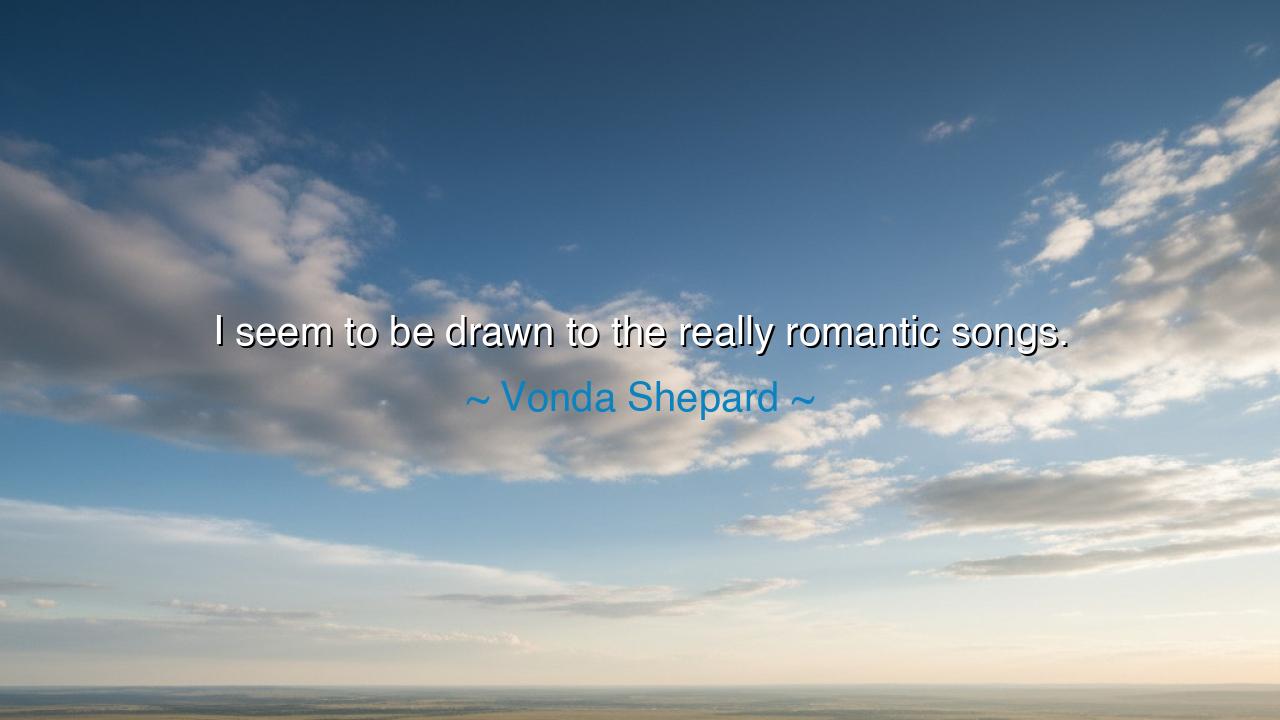
I seem to be drawn to the really romantic songs.






To be drawn to the truly romantic songs, as Vonda Shepard so poetically describes, is to be pulled by the very essence of the human spirit—that ethereal force which seeks connection, longing, and love. The romantic song is not merely a collection of notes and words, but the voice of the heart, calling out across time and space. When we are drawn to these songs, we are not merely responding to melody or rhythm; we are listening to the very soul of humanity, to our deepest emotions, the desires that connect us all, across generations and cultures. Vonda Shepard's words remind us that romance is a universal theme, one that transcends the mundane and touches the divine, a yearning that has existed from the dawn of time.
For romance, as an idea, is as old as the human heart itself. From the earliest of mythologies, stories of love have carried humanity forward. Consider the tale of Orpheus and Eurydice, two souls entwined by the most profound love. When Orpheus descended into the Underworld to retrieve his beloved, his music—a romantic song of longing and sorrow—reached the ears of the gods. His song, filled with such beauty and emotion, had the power to sway the very forces of death itself. This tale illustrates the romantic song as a conduit between the realms of life and death, a medium that can transcend earthly limitations. And in this, we see the very nature of the song that Vonda Shepard describes—one that speaks not only to the heart, but to the very soul, carrying us to places of profound connection.
In every age, the romantic song has been the companion of the lover, the poet, and the dreamer. It is the melody that has soothed the hearts of warriors before battle and calmed the minds of rulers after triumph. It has been sung in the courts of kings and in the quiet solitude of the moonlit night. The great beacon of love, it illuminates the paths of those who are lost, and guides them back to the light of their heart’s desire. Think of the romantic ballads sung throughout history—songs that speak of love’s triumphs and tragedies. From the minstrels of medieval courts to the bardic songs of Celtic lands, the theme of romantic yearning persists in the very fabric of human culture.
It is said that even the great Shakespeare—who wove the deepest, most complicated tales of human emotion—understood the power of romance. His Romeo and Juliet, that tragic tale of love, is itself a song of longing, a melody that has reverberated through the ages. The passion of Romeo’s words, his vow to Juliet, carries a depth of emotion that few can resist. Even in their tragic end, their love sings through time, reminding us of the strength and fragility of human connection. It is in such moments, in such songs, that the human heart finds its reflection and, perhaps, its redemption.
Vonda Shepard’s draw to these songs is not a mere fleeting attraction—it is a call to understand something deeper within ourselves. The romantic song serves as a mirror to the human condition, showing us our desires, our losses, our yearnings. It speaks of a love that is not always realized, of a love that is unfulfilled, and yet, this very longing is what makes it so powerful. Romance, in its truest form, is not merely the joy of finding someone to love, but the profound beauty found in the pursuit of love itself. The song reminds us that the journey toward connection is as important, if not more so, than the destination.
So, what lesson can we draw from this fascination with the romantic song? It is this: that in our lives, we must not shy away from desire or longing. The human heart, like the romantic song, is meant to yearn, to reach out beyond the present moment, to touch something greater, something eternal. We must embrace the romantic spirit in all its forms—not merely in love for another person, but in love for life, for the art we create, for the relationships we build. Just as the romantic song can lift us from sorrow to joy, we too must allow the music of our lives to guide us through the storms and into the light.
Thus, we are called to listen to the romantic songs that echo within us. Seek out the melodies that stir your soul, the words that speak to your deepest emotions. Allow yourself to be drawn to the songs of love, not only in others but in your own heart. Let romance guide you to a life of greater depth, connection, and understanding. For in the romantic song lies not just a reflection of who we are, but a glimpse into the very essence of what it means to be human—forever longing, forever loving.






AAdministratorAdministrator
Welcome, honored guests. Please leave a comment, we will respond soon